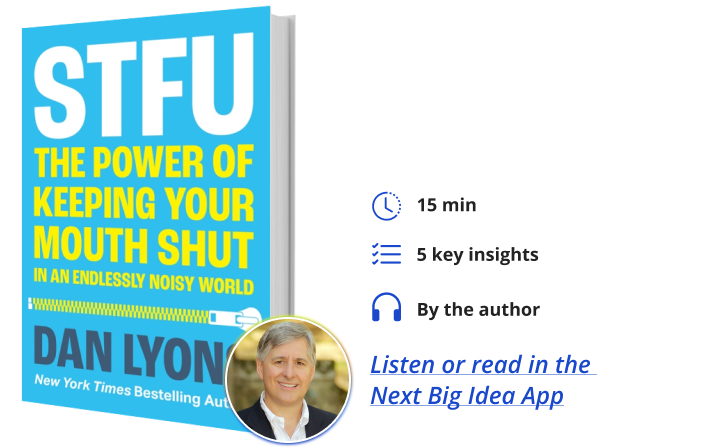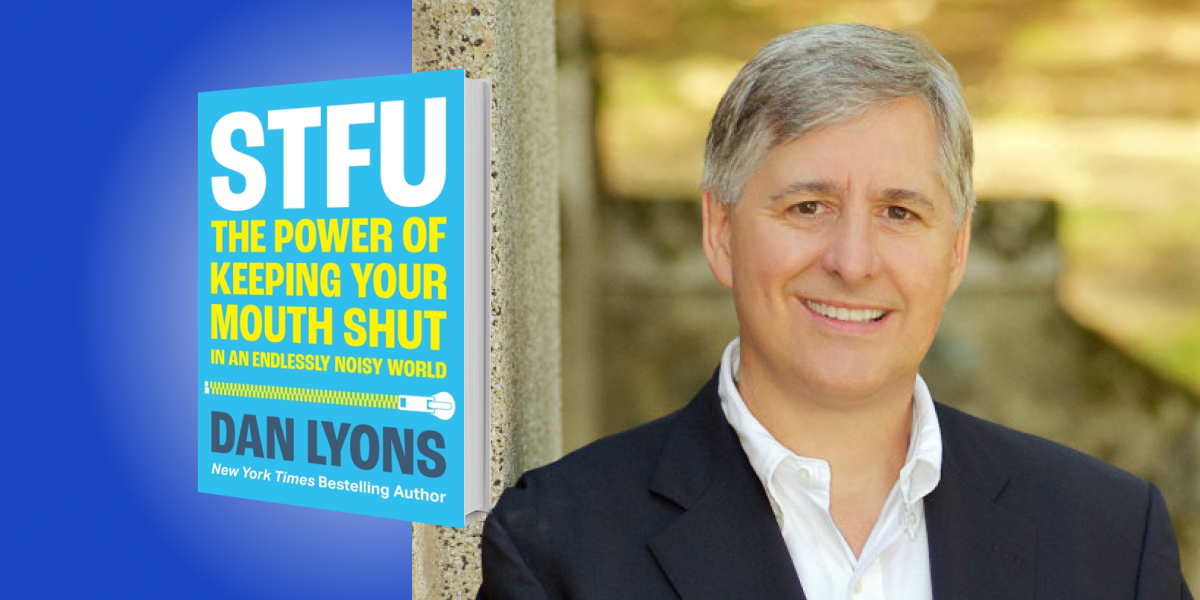Dan Lyons is the author of Disrupted: My Adventures in the Startup Bubble, a New York Times bestselling memoir, and Lab Rats: How Silicon Valley Made Work Miserable for the Rest of Us. He was also a writer for the hit HBO comedy series Silicon Valley. As a journalist, he spent a decade covering Silicon Valley for Forbes, ran tech coverage at Newsweek, and contributed to Fortune, the New York Times, Wired, Vanity Fair, and the New Yorker. He is a senior brand & content strategy director at DocuSign.
Below, Dan shares 5 key insights from his new book, STFU: The Power of Keeping Your Mouth Shut in an Endlessly Noisy World. Listen to the audio version—read by Dan himself—in the Next Big Idea App.

1. How you speak is who you are.
Speech is how we define ourselves, and it shapes the way we perceive others. When you try to explain what someone is like, you usually define their personality by describing the way they speak. Fast talker or slow talker? Quiet or loud? Talkative or taciturn? Our speech is how we reveal our personality to the world. In a way, the way we speak is our personality. If you change the way you speak, you are in effect changing yourself.
Talking is like breathing. You don’t think about it; you just do it. When you start paying attention to how you speak, this leads you to think about why you speak the way you do. You’re forcing yourself to become conscious of something that usually happens unconsciously. You’re doing the kind of work you might do through meditation or psychotherapy. You’re turning your attention inward. You’re engaging in self-reflection and self-examination. You’re figuring out who you are.
2. Someday we may use speech as a form of medicine.
Matthias Mehl is a psychology researcher at the University of Arizona and he has spent the past 20 years studying the way people speak, searching for connections between the way we speak and our physical and emotional well-being. To do this, Mehl uses a device called an Electronically Activated Recorder (EAR). People carry it around with them for a few days, and it switches itself on at random times to capture what they’re saying.
His first big experiment involved counting how many words people spoke in a day and who spoke more, men or women. At the time, a lot of people believed that women spoke way more than men, but Mehl found that there was no difference, both spoke about 16,000 words a day.
“He found that people who spend less time blabbing and engaging in small talk and devote more time to substantive conversations are happier.”
Next, Mehl started studying not just how many words people spoke, but what they were talking about. A few years ago, he found that people who spend less time blabbing and engaging in small talk and devote more time to substantive conversations are happier. So much so that having good conversations, “might be a key ingredient to a satisfied life.”
That was pretty intriguing, so Matthias tried something else. He set out to see if substantive conversations might also be related to physical health and remarkably enough, he discovered that there is a connection; people who have better conversations have healthier immune systems.
To Mehl this made perfect sense; after all, speech is central to our being. He believes we’re going to learn a lot more in the coming years. One day, he says, instead of prescribing pills, your doctor might tell you, “Take two good conversations and call me in the morning.”
3. You should quit social media, or at least dial it way back.
Social media companies use a business model that depends on keeping you online for as long as possible. To make the most money, they need to keep you “engaged,” which means instead of just reading, they need you to be posting, tweeting, sharing, and liking, and they’ve found that the best way to do that is to make you angry. That’s pretty bad, but even worse is that the anger you experience online carries back with you into your real life, creating an age of agitation. Have you noticed how much angrier the world is today than it was 20 years ago, or even 10 years ago? We’re all walking around feeling triggered and we feel helpless against it.
Another problem is that it’s really hard to break free from social media because the apps are designed to be addictive. These apps give you little jolts of dopamine, a feel-good hormone. You start to crave that dopamine, and so you keep going back. Anna Lembke, a scientist at Stanford, treats digital addiction by putting people on a “dopamine fast,” where they stop using all screens, not just phones but also computers and TV, for a period of time. She says for some people these fasts are as effective as anti-depressants. The only way to regain control and protect yourself is to quit social media or at least dial it way back.
“The anger you experience online carries back with you into your real life, creating an age of agitation.”
That’s only part of the solution. In addition to social media, in this age of agitation, we are blitzed with tidal waves of content on streaming services, podcasts, and YouTube channels, all this information is overwhelming our brains.
We also need to stop buying into the idea that we need to seek constant attention from other people online. That means pushing back against a world that does not just encourage us to talk too much but practically demands it. We have somehow come to believe that we should measure our success by our ability to gain attention. Everybody is out trying to get more followers on Twitter, or be a TikTok influencer. It creates a kind of desperate chase for attention that’s not good for our souls. Imagine how much better you would feel, and how much nicer the world would be, if we all managed to talk just a little less and listen a little more.
4. Most of the world’s most powerful and successful people are under-talkers.
Powerful people don’t run around gabbing and shooting their mouths off—with a few big exceptions. Without naming them, you probably know who they are. Most powerful people hold back, they say less than they need to and when they do speak, they’re intentional about what they say.
Barack Obama is one of the world’s greatest speakers, but he’s an even better listener. Richard Branson, the founder of Virgin Group, and a relentless self-promoter, extols the virtue of being a shutter-upper in meetings. Apple CEO Tim Cook is famously quiet; he uses silence to draw information out of people.
Silence is power. Notice that nobody ever talks about the “strong, talkative type.” Over-talkers are perceived as weak, incompetent, and unsure of themselves. They are also hated by their colleagues, and less likely to get promoted at work. If you want to be successful at work, learn how to STFU.
“Notice that nobody ever talks about the ‘strong, talkative type.'”
Powerful people also know how to get comfortable with uncomfortable silences. Most of us hate it when a conversation goes silent. Researchers have found that it takes only four seconds for people to start feeling antsy. When that happens, we jump in and try to fill the void by saying something, anything. This is a trick that a lot of people use in negotiations; they will simply stop talking and sit there. They’re betting that the other person will feel uncomfortable and start talking, and with some luck will start negotiating against themselves, talking themselves into a bad deal. Car salesmen are trained to do this to customers to make you uncomfortable. Try doing it back to them and see what happens.
5. Listening is a superpower.
Jennie Jerome, Winston Churchill’s mother, once contrasted the experience of having dinner with two big-shot British politicians: William Gladstone and Benjamin Disraeli. “When I left the dining room after sitting next to Gladstone, I thought he was the cleverest man in England. But when I sat next to Disraeli, I left feeling that I was the cleverest woman.”
If you ask the right questions, pay close attention to the answers, sit in silence, and let other people talk, people will reveal themselves to you. When people feel authentically seen and heard, they shine, just like Jennie Jerome did when she had dinner with Benjamin Disraeli. Imagine having that effect on everyone in your life!
The thing is, it’s really difficult to become a good listener, and it’s exhausting to do it well. Sandra Bodin-Lerner is a master listener. She runs a group called the International Listening Association and teaches a course in listening at Kean University in New Jersey. Listening is also huge for parents. Next time your kid has a problem, resist the urge to try to solve it for them; just sit, be present with them, but be quiet. If you do speak, ask open-ended questions, and then listen, wait, and let them talk. Chances are they will work their way around to solving the problem on their own. When this works, it feels like magic.
To listen to the audio version read by author Dan Lyons, download the Next Big Idea App today:































